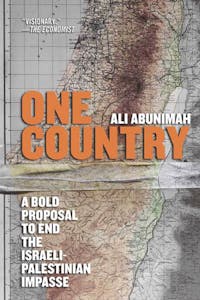One Country
A Bold Proposal to End the Israeli-Palestinian Impasse
 Download image
Download image
ISBN10: 0805086668
ISBN13: 9780805086669
Trade Paperback
240 Pages
$19.00
CA$25.99
The Israeli-Palestinian war has been called the world's most intractable conflict. It is by now a commonplace that the only way to end the violence is to divide the territory and separate the two peoples, and all efforts at a resolution have come down to haggling over who gets what: Will Israel hand over 90 percent of the West Bank or only 60 percent? Will a Palestinian state include any part of Jerusalem?
One Country proposes an alternative: to revive an old and neglected idea of one state shared by two peoples. Ali Abunimah shows how the two are by now so intertwined—geographically and economically—that the pursuit of separation is doomed to fail, providing neither the security Israelis need nor the rights Palestinians must have. He reveals the bankruptcy of the two-state approach, takes on the objections and taboos that stand in the way of a binational solution, and demonstrates that sharing the territory will bring benefits for all. The absence of other workable options has only lead to ever greater extremism; it is time, Abunimah suggests, for Palestinians and Israelis to imagine a different future and a different relationship.
Defying the present climate of hopelessness and deadlock, Abunimah argues that a vibrant, thriving Jewish community can coexist alongside a Palestinian nation, reunited and healed after decades of dispossession, in a new entity that is equally and simultaneously the Jewish state and the Palestinian state.
Reviews
Praise for One Country
"A provocative and well-written account attacking the same failure of imagination that delivered to the world the present Arab-Israeli calamity . . . One Country is a valuable springboard for debate, conventional thinking having been so counterproductive to peace."—Clayton E. Swisher, Middle East Policy
"Ali Abunimah challenges the conventional thinking that partition is the only acceptable option . . . mak[ing] the case for a one-state solution based on legal equality between Israel and the Palestinians. On its face, this idea is based fundamentally on common sense. It is a powerful effort because it aims to satisfy what the Palestinian and Israeli people truly desire, normalcy on a land they share a reverence for. The American experience with race relations shows that no state can build democratic institutions merely for one group while excluding others. This holds true for the Jewish state as well."—Will Youmans, The Arab-American News
"Much recent commentary on the stalled Middle East peace process has focused on ways to redirect Israelis and Palestinians toward the ‘road map for peace,' which aims to end hostilities by gradually establishing an independent Palestinian state that would exist alongside, albeit entwined with, the Israeli state. With this book, an outspoken advocate for the Palestinian cause argues that peace in the region can be better achieved by establishing a single, united, democratic state. Abunimah is not, of course, the first to propose a one-state, or 'binational,' solution—indeed, interest in a one-state solution has grown as the two-state model has sputtered—and he is well aware of the obstacles to a one-state solution: namely, that socioeconomic inequality, disproportionate birth rates, and a perceived loss of sovereignty would seem to provide meager incentives for Jewish Israelis. But Abunimah's approach, inspired by ongoing reconciliation processes in South Africa (and, to a lesser extent, Northern Ireland), is fresh, energetic, and ultimately optimistic that those tired of violence will eventually gravitate toward an inclusive, unified Israel."—Brendan Driscol, Booklist
"'What will it take to make peace between Israelis and Palestinians?' asks a Palestinian-American journalist. His answer is a bold proposal indeed. Abunimah suggests that Palestinians and Israelis agree to inhabit the same nation, enjoy the same rights and responsibilities and accept each other as compatriots. Peace does not require that both sides share an 'agreed narrative' of what happened in 1948, as some commentators have suggested. But, Abunimah urges, 'It is unacceptable for a Palestinian to draw on his history of oppression and suffering to justify harming innocent Israeli civilians,' just as it is for an Israeli to use the idea of a covenant between God and Abraham to force Palestinians out of their ancestral home. Indeed, he adds, the success of the 1998 Good Friday Agreement in Northern Ireland and of Belgian federalism has not hinged on agreed narrative; 'changing society,' he writes, 'does not require us to forget or revise the past.' (Good thing, too, given the long memory for outrage and wrong that people around the world, and not just in the Middle East, possess.) Moreover, Abunimah writes, there is no reason why the Middle East could not harbor a multiethnic democracy along the Swiss—or Canadian, or South African—example. Though the current models provided by the Oslo Accords and the aborted Bush 'road map' push for two-state partition and further fragmentation of what are now occupied territories, Abunimah counters that their fates are so closely intertwined that 'the free and consenting union of two principal national communities, Israeli Jews and Palestinians, which each have multiple subcultures, shared histories, and sometimes irreconcilable narratives binding them to the country' is the only hope for peace. Abunimah's proposal requires deep reservoirs of good will and a willingness to forget at least a few injuries. History will determine whether it's a pipe dream, but it deserves the widest discussion."—Kirkus Reviews
Reviews from Goodreads
BOOK EXCERPTS
Read an Excerpt
One Country
CHAPTER ONE
An Impossible Partition
UK foreign secretary Jack Straw stood at the dispatch box in a packed House of Commons. After parrying members' questions on the intricacies of European Union (EU)...


